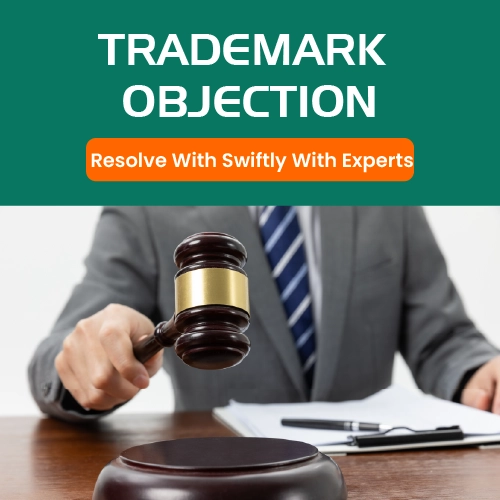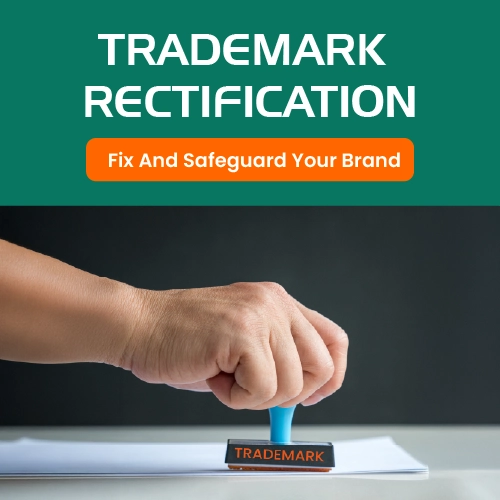
Trademark Opposition
This process ensures that conflicting or misleading trademarks do not proceed to final registration.
Documents Needed
- Signed Evidence
- Signed Evidence
- Advertisement Copies
PRICE
3999
Excluding Taxes
*Terms and Conditions Apply
OFFERS
-
Free Consulting
-
2 Months free on 1 year service purchase
-
18% Off On GST Registration
Need A Free Consultation For Your Business?
Fill up the form to get free consultation
Understanding Trademark Opposition
Once a trademark application is accepted, it is published in the government journal for four months. During this period, any individual can oppose its registration. This process ensures that conflicting or misleading trademarks do not proceed to final registration.
Who Can File an Opposition?
As per Section 21 of the Trademarks Act, 1999, any person—whether a competitor, customer, or general public—can file an opposition. This step is crucial in protecting existing trademark rights and preventing market confusion.
Grounds for Trademark Opposition
- Similarity with an existing registered trademark
- Lack of distinctiveness
- Descriptive nature of the trademark
- Bad faith registration
- Deceptive or misleading nature
- Violation of legal provisions
- Religious sensitivity concerns
Trademark Opposition Services by My Jama Kharch
Once a trademark application is accepted by the registry, it undergoes a critical phase—publication in the government journal for a period of four months. During this time, any member of the public has the right to oppose the trademark. This stage is crucial in determining whether the trademark proceeds toward registration or if valid objections need to be addressed. My Jama Kharch is committed to providing expert assistance in navigating the trademark opposition process in India, ensuring smooth and effective resolution.
Understanding Trademark Opposition
Under the Trademarks Act, 1999, businesses in India can register their trademarks by submitting an application to the Registrar of Trademarks. Once the application is reviewed, the Registrar publishes the trademark in the official journal. At this point, anyone can challenge its registration. Such oppositions must be filed with the Trademark Registry where the application was originally submitted. In case of an opposition, the trademark registry schedules a hearing to resolve the matter.
The guidelines and procedures for trademark opposition in India are governed by the Trademarks Act, 1999, and the Trade Marks Rules, 2017.
Who Can Oppose a Trademark?
According to Section 21 of the Trademark Act, any individual, irrespective of their commercial or personal interest, has the right to oppose a trademark. This includes customers, competitors, or any concerned party. The opposition is particularly relevant for prior registered trademark owners who believe the new application infringes upon their rights.
Once an opposition is filed, both parties must present their case to determine whether the trademark should proceed toward registration or be abandoned.
Grounds for Trademark Opposition
Indian trademark law does not specify rigid grounds for opposition, but common reasons for opposing a trademark include:
- The proposed trademark is identical or too similar to an existing registered trademark.
- The trademark lacks distinctiveness.
- It is descriptive rather than unique.
- The application was filed in bad faith.
- The term is generic or customary in a particular trade.
- The trademark could mislead the public or create confusion.
- It contradicts legal provisions or is prohibited under specific laws.
- It contains elements that may offend public sentiments or religious beliefs.
Trademark Opposition Process
Step 1: Filing an Opposition Notice
If someone wishes to oppose a trademark, they must submit an opposition notice to the Registrar within four months of the application’s advertisement in the trademark journal. This is done using Form TM-O along with the applicable fee. The notice should include details of the trademark application, the opposing party’s information, and the grounds for opposition. Once received, the Registrar forwards this notice to the applicant within three months.
Step 2: Counterstatement Submission
Upon receiving the opposition notice, the applicant has two months to respond with a counterstatement using Form TM-O. This response should address the opposition claims. If the applicant fails to respond within the given timeframe, their trademark application is deemed abandoned.
Step 3: Evidence Submission
Both parties must submit evidence to support their claims:
- The opposing party submits evidence within two months of receiving the counterstatement.
- The applicant has two months to respond with supporting evidence.
- If needed, the opposing party can submit additional evidence within one month of receiving the applicant’s response.
Step 4: Trademark Opposition Hearing & Decision
The Registrar schedules a hearing after evidence submission, and both parties are notified. If the opposing party is absent, their opposition is dismissed, allowing the trademark to proceed. If the applicant is absent, their application is abandoned. The Registrar considers all written arguments and issues a final decision in writing.
Final Steps
If the Registrar rules in favor of the applicant, the trademark is registered, and a certificate is issued. If the opposition is upheld, the trademark registration is denied.
Importance of Compliance in the Opposition Process
Both the applicant and the opposing party must adhere to deadlines and filing requirements. Failure to do so can have serious consequences:
- If the opposing party does not submit the required documents, the opposition is abandoned.
- If the applicant fails to respond, the trademark application is removed.
Why Trademark Opposition Matters
The trademark opposition process ensures that only valid trademarks receive registration, preventing conflicts in the market. Timely responses and compliance with legal procedures are essential for a successful case.
How My Jama Kharch Can Help
My Jama Kharch provides expert guidance throughout the trademark opposition process, ensuring a seamless experience for clients.
Our Services Include:
- Expert Consultation: Our seasoned professionals offer valuable insights into trademark laws and help build a solid opposition case.
- Thorough Trademark Search: Before initiating an opposition, we conduct in-depth research to identify similar or conflicting trademarks.
- Document Preparation: We assist in drafting accurate legal documents required for filing a trademark opposition.
- Efficient Filing Process: We handle all aspects of submission, ensuring timely compliance with legal requirements.
- Regular Updates: We keep clients informed throughout the process to ensure a smooth and stress-free experience.
Difference Between Trademark Objection and Trademark Opposition
Many people confuse trademark objection with trademark opposition. Below is a simplified distinction:
| Feature | Trademark Objection | Trademark Opposition |
|---|---|---|
| Raised By | Trademark Examiner | Third Party/Public |
| Timing | Before publication in the journal | After publication in the journal |
| Purpose | Examiner’s doubts on registrability | Challenge by external party |
| Process | Response to examiner, hearing if needed | Opposition hearing & evidence submission |
If you are facing a trademark opposition or considering opposing a trademark, My Jama Kharch is here to assist you every step of the way. Contact us today for expert trademark-related services, including registration, opposition handling, renewal, and more.
My Jama Kharch – Ensuring Your Brand’s Legal Protection with Confidence!
What Our Customers Say



One Stop Solution
For All Your Company Compliances
We provide end-to-end compliance solutions for businesses, ensuring hassle-free registrations, filings, and legal formalities. Stay compliant with expert guidance and seamless services.
Related Compliances and Company Registrations
Recently Registered Trademark By Us
Popular Services
Professional Support for Your Business

















